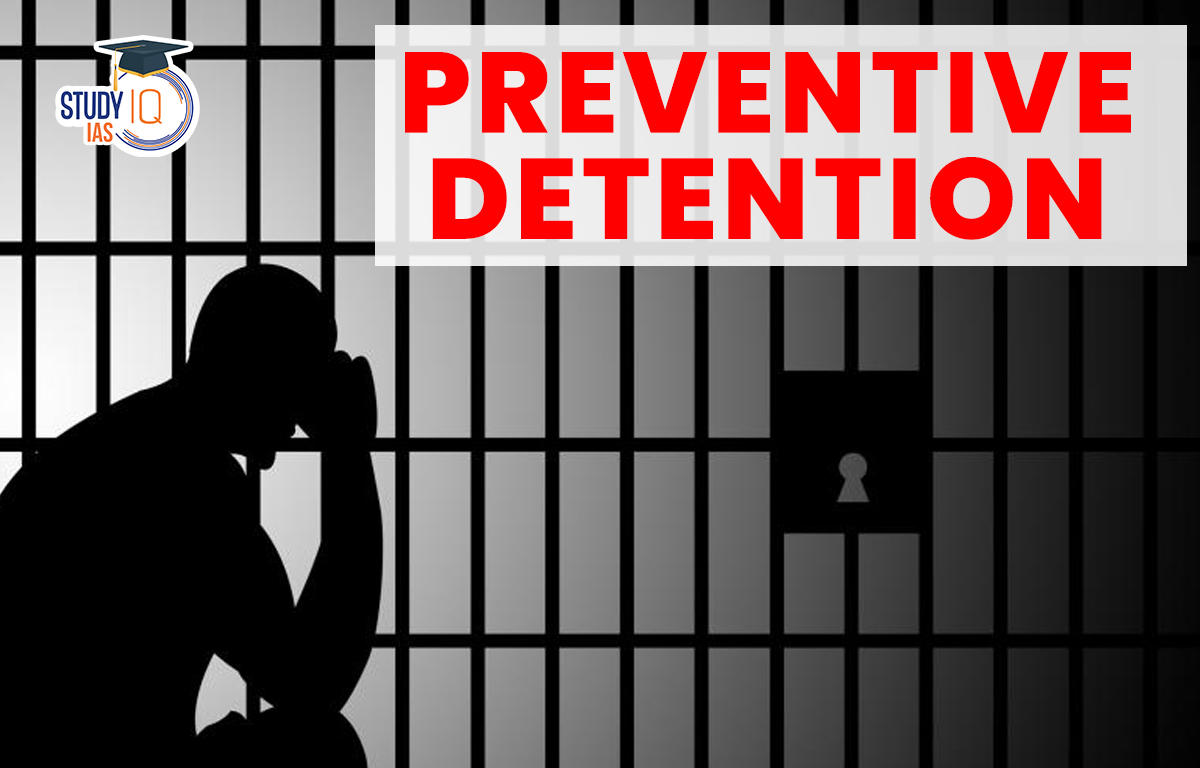Table of Contents
Context: Recently, Supreme Court observed that preventive detention laws in India are a colonial legacy and confer arbitrary power to the state.
About Preventive Detention
- It is detaining a person in order to prevent a situation of crime that a person can possibly commit.
- It is an administrative action on the grounds of the suspicion that some wrong actions may be done by the person concerned which will be prejudicial to the state.
- A detainee under preventive detention has no right of personal liberty guaranteed by Article 19 or Article 21.
- Constitutional Provisions
- Article 22(3)(b): It allows for the preventive detention and puts restriction on personal liberty for ensuring state security and public order.
- Article 22(4): States that no law providing for preventive detention shall authorize the detention of a person for a period longer than three months. In case of extended extension, a report by the advisory board is required for sufficient cause.
- 44th Constitutional Amendment Act: The amendment reduced the period of detention without obtaining the opinion from the advisory board from three to two months, however, this provision is yet not implemented and thus the original period of three months continues.
- Constitution of India gives the Parliament the authority to enact rules governing preventive detention where they are necessary for national security, foreign policy, or defence. Parliament has sole authority over legislation.
- Rational for Preventive Detention
- The security of the state
- Maintenance of the public order,
- Maintaining essential services and defense
- Foreign affairs with the security of India
Safeguard Against Misuse of Preventive Detention
- Time-period: A person may be taken to preventive custody only for 3 months at the first instance.
- If the period of detention is extended beyond 3 months, the case must be referred to an Advisory Board consisting of persons with qualifications for appointment as judges of High Courts.
- Permission of Advisory board: It is implicit that the period of detention may be extended beyond 3 months, only on approval by the Advisory Board.
- Grounds of detention: Detainee is entitled to know the grounds of his detention.
- The state, however, may refuse to divulge the grounds of detention if it is in the public interest to do so.
- This power conferred on the state leaves scope for arbitrary action on the part of the authorities.
- Legal options: Detaining authorities must give the detainee earliest opportunities for making representation against the detention.
Concern with Preventive Detention
- Against public interests: It gives the government power to withhold information that it deems would be against the interests of the public.
- Abuse provisions: Authorities frequently abuse the capability of preventive detention by extending the provisions to unqualified cases.
- Violation of rights: Using the preventive detention law in times of peace is considered “anachronistic.”
- Against legal rights: Any individual who is arrested must be advised of the reason(s) for the arrest and have the option of posting bail, as per Section 50 of the Criminal Procedure Code (CRPC). However, in practice, securing bail is rarely an easy process.
Supreme Court Judgments on Preventive Detention
- AK Gopalan v. State of Madras: court ruled that Article 22 of the Constitution provides complete procedural safeguards with regard to preventative detention.
- Anil Dey v. State of West Bengal: Supreme Court concluded that courts cannot evaluate whether the detaining authority is objectively competent by looking past its subjective satisfaction.
- Alijav v. District Magistrate, Dhanbad: According to the Supreme Court, preventive detention does not penalize a person for an offence they committed, whereas criminal processes do.
- Ankul Chandra Pradhan v. Union of India: The goal of Preventive Detention is to prevent the inmate from doing anything that could endanger the state’s security, not to punish them.
- Supreme Court in July 2022 observed that these powers accorded to the State were “exceptional” and that since they affect the liberty of an individual, they should be used sparingly.
- The court had also noted that these powers should not be used to control ordinary law and order problems.
Punitive Detention
- It is to punish a person for an offence committed by him after trial and conviction in a court.
- Its purpose is to punish a person for an offence.
- A detainee under punitive detention can have the right of personal liberty guaranteed by Article 19 or Article 21.


 SSC Stenographer 2024 Notification Out a...
SSC Stenographer 2024 Notification Out a...
 IB SA MTS Final Result 2024 Out at mha.g...
IB SA MTS Final Result 2024 Out at mha.g...
 Model Skill Loan Scheme, Eligibility, Re...
Model Skill Loan Scheme, Eligibility, Re...

















